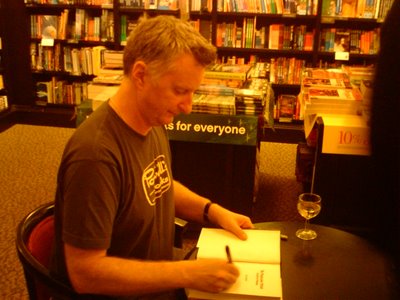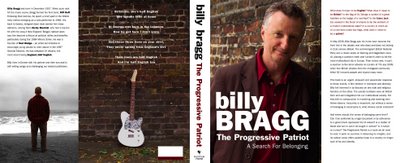 I got to see a folk hero of mine, Billy Bragg, speak about his new book The Progressive Patriot, A Search for Belonging tonight.
I got to see a folk hero of mine, Billy Bragg, speak about his new book The Progressive Patriot, A Search for Belonging tonight.Billy talked about the origins of the book in his disgust at the election of a BNP councillor in his home town of Berking and Dagenham in Essex.
Since his previous album, England Half English, Billy has been trying to reclaim a sense of Englishness from a right wing agenda.
Tonight he spoke about his first stirrings of an English identity when, ironically, hearing Simon & Garfunkel's Scarborough Fair played to him at school (S&G drawing on the English folk scene when they visited Britain).
Billy related how his political roots solidified in the Rock Against Racism carnival of 1978 when 100,000 people 'just like me' had the courage to challenge racism and - as Bragg found himself standing under a gay liberation flag and finding himself listening to Tom Robinson's 'Glad to be Gay' - he also realised the connection between racism, homophobia and sexism.
Since then he says he has had a faith in popular culture to change the world (something reflected in his recent song 'I Keep Faith') and the ability of a performance to change the perspective of an audience's thoughts.
 His new book apparently sets out counter arguments to contemporary racist nationalism and puts forward instead a new agenda for patriotism based on the concept of belonging.
His new book apparently sets out counter arguments to contemporary racist nationalism and puts forward instead a new agenda for patriotism based on the concept of belonging.Halfway through writing the 7/7 bombings occurred and this is reflected in the book, he said. He commented on how, externally, the bombers were thoroughly 'assimilated' to British culture (in one of the suicide bomber's videos he noted how the bomber was speaking "with a flat Yorkshire accent") but in fact all of the bombers lacked any real sense of belonging.
Typically Bragg rejects the Telegraph/Daily Mail call for a return to 'British values', claiming that they are meaningless, and instead he alights on the concept of 'fair play', tracing it back through various popular historical rejections of arbitrary power (Magna Carta, the Civil War, the Luddites, Chartists and Suffragettes, and the Second World War.)
The celebration of that - in particular through creation of a Bill of Rights - rather than the current identity of "Brits being most famous in Europe merely for getting arse-holed and falling down at 3am..." will be more useful for creating a unified sense of identity, he said.
"Fairness is the great social engine of change"
He's now urging that Britain should spend the new year (the 300th anniversary of the creation of the UK) discussing how to create a new written Bill of Rights setting out popular freedoms and responsibilities and that this he believed would help reengage people politically.
His bottom line was, "I don't care what you believe, I just want to know how are my kids going to get on with yours?"